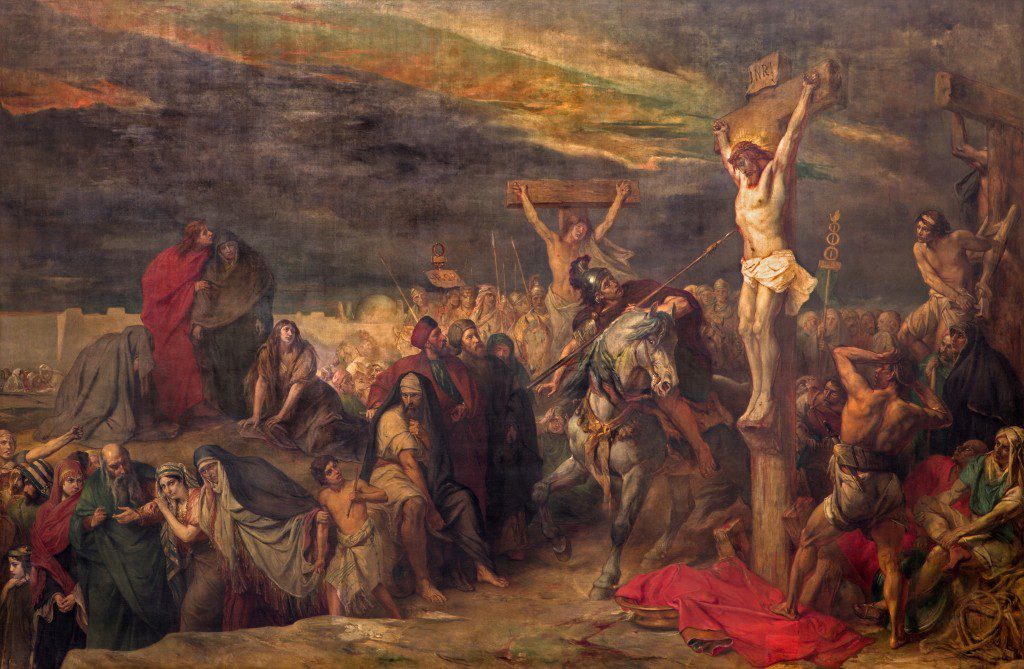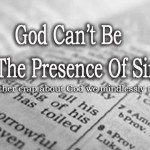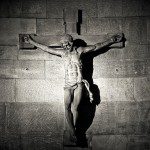This is post 2 of 3 on philosophical reflections on the cross by pastor and philosopher, Jeff Cook
…
How we see the cross matters.
Benjamin L. Corey here wrote, “the character of God we think we see on the cross becomes our foundation of understanding who God is.” Is the cross required to keep an enraged Father from unleashing his wrath on dysfunctional humanity? Is the cross a method of appeasing a blood thirsty deity? Is God unable to forgive without blood?
Take this a step further. The message we believe the cross conveys will tells us not only who we believe God is, but also who we think we are. Are human beings scum which God would be pleased to annihilate, a loathsome spider dangling over an eternal fire? Are human beings an after thought for a deity powerful enough to create nebula and eco-systems? Are human beings a failed experiment? How we interpret the crucifixion of Jesus will be a mirror for how we see ourselves.
Augustine argued that, given God’s power, God could have redeemed humanity in many possible ways, but that the crucifixion of Jesus was “both good and befitting the divine dignity.” God could have created any possible world with countless different redemption stories (if necessary) and countless forms and paths for humanity—but God choose us, and God chose this world, and at histories center he placed the cross.
Perhaps the most invigorating of meditations is to simply ask, “why?”
When we do a swell of answers begin to arise. No matter which way we turn the cross, we see new and surprising beauties—because … The cross is a diamond. The cross kaleidoscopically unveils the character of God in a “rich variety” of ways that are “beauty ancient yet ever new” (Augustine).
Consider a few.
The cross is a sacrifice. Jesus spoke of a man who entered a field and found a treasure within and in his joy he went and sold everything he had to buy that field. The man in the story is Jesus. The field is the world and in this world Jesus has found a treasure—and that treasure is you, that treasure is me. And through the cross Jesus has given everything he had to purchase the field so he might return and embrace that for which he gave everything he had.
The cross is the way to the best possible life. We are told in order to be a healthy human being we must “love God with all our heart and soul and mind and strength.” Nothing encourages this more than being loved by God with all His heart and soul and mind and strength—and we experience that ever pursuing love through Jesus’ self-chosen crucifixion.
The cross enflames our hope. We find in ourselves a strange double truth: we long to become like God—merciful, just, courageous, wise, alive—and yet the closer we get to God the more insignificant and inadequate we appear to be. The cross alone overcomes this. The cross tells us that we have unsurpassable value, that our many sins have been eliminated in the body of Christ, and that we are radically invited to embrace all that God offers. Because of Jesus death, we may “approach God without pride and humble ourselves without despair” (Pascal).
The cross changes the nature of suffering and death. “When Christ was baptized, it was He who changed the water (giving it the power to give new spiritual life) rather than the water that changed Him. So too when Jesus suffered and died He changed suffering and death rather than suffering and death changing Him … Jesus entered death, and conquered it. Death did not enter and conquer him” (Peter Kreeft). Because of Christ, we may live—freed from every fear, risen above the shame the world would cast on those who suffer.
The cross is a throne. The Gospel is the royal announcement that Jesus is king. Each of the four biographies of Jesus display what it looks like for all authority in heaven and on earth to be given to Christ, and they each end with a coronation.
They tell us that in the last week of his life, Jesus entered the capital city on a colt as a royal figure. He judged the temple as a failure, something only the king could do. He was anointed with oil. On Thursday night he was escorted by a military procession to stand before the people’s representatives: the religious elite said, “You are the Son of God?” and the spokesperson for Rome said, “You are the King of the Jews?” Jesus received them, not as questions, but as declarations.
Pilate then sent Jesus to be crowned and robed by the decommissioned king over Israel and his men. They escorted Jesus out before the masses who cried for him and no other to take the throne. A royal parade led Jesus to the highest point in the land where he took his seat on the sedile of a cross. Finally enthroned and surrounded by family and priests, scriptures were shared, wine drank, songs sung, and pardons offered as the great languages of the day proclaimed over his head, “This is Jesus of Nazareth, the King of the Jews.”
The cross is a door leading to a new kingdom. When Adam and Eve ate from the tree, “their eyes were opened” (Gen 3.7), and they entered a new reality. So too those who eat from the Jesus-tree through the Eucharist have “their eyes opened” (Luke 24). Paul wrote of his vocation that he was sent “to open eyes so that they may turn from the power of darkness to light” (Acts 26.17). The cross then awakens us to the rehumanizing alternative to the reign of sin and death. We need not serve the self-destructive, creation-corroding, knee-jerk rule of sin. We may serve the crucified and risen one knowing we have been “rescued from the power of darkness and transferred into the kingdom of God’s beloved Son” (Col 1.12-13).
Because we see that God positioned Christ “above all rule and authority and power and dominion,” we likewise know that his Power is at work within us. As such we are his people, citizens of heaven who—despite the apparent power of sin—may live boldly in the power of his Spirit with unwavering confidence.
The cross is the only source of humanizing equality. We are equal before the law, but the law makes us equals in failure, shame and death. Conversely, the cross makes us equal through grace. The cross unveils the unsurpassable worth of every human soul, and as such all people have a new, beautifully-equivalent human worth, for “the ground is level before the cross.”
The cross deconstructs everything. In all these ways and more we not only see God through the cross, we see ourselves through the cross. We see human dignity and freedom through the cross. We see the meaning of pain, the triumph of good over evil, and the purpose of our very universe through the cross. Apart from the cross we would not know the meaning of life or death or pain or God or ourselves. The cross has a breath-taking, paradigmatic power to unveil and define the hidden nature of reality.
And what shall we say about the cross’s ability to heal, its transformation of all anthropology and the nature of power? What shall we say of the cross’s ability to renew our relationship with God and others, of the ineffectiveness of violence, or the nature of the New Creation?
The cross is “the wisdom of God in its rich variety,” and its depths are apparently never-ending.
JEFF COOK teaches philosophy at the University of Northern Colorado and pastors Atlas Church in Greeley, Colorado. He is the author of Everything New: Reimagining Heaven and Hell and Seven: the Deadly Sins and the Beatitudes. He will release his third book, Small Batch Church, in 2017. Connect with him @jeffvcook or www.everythingnew.org












